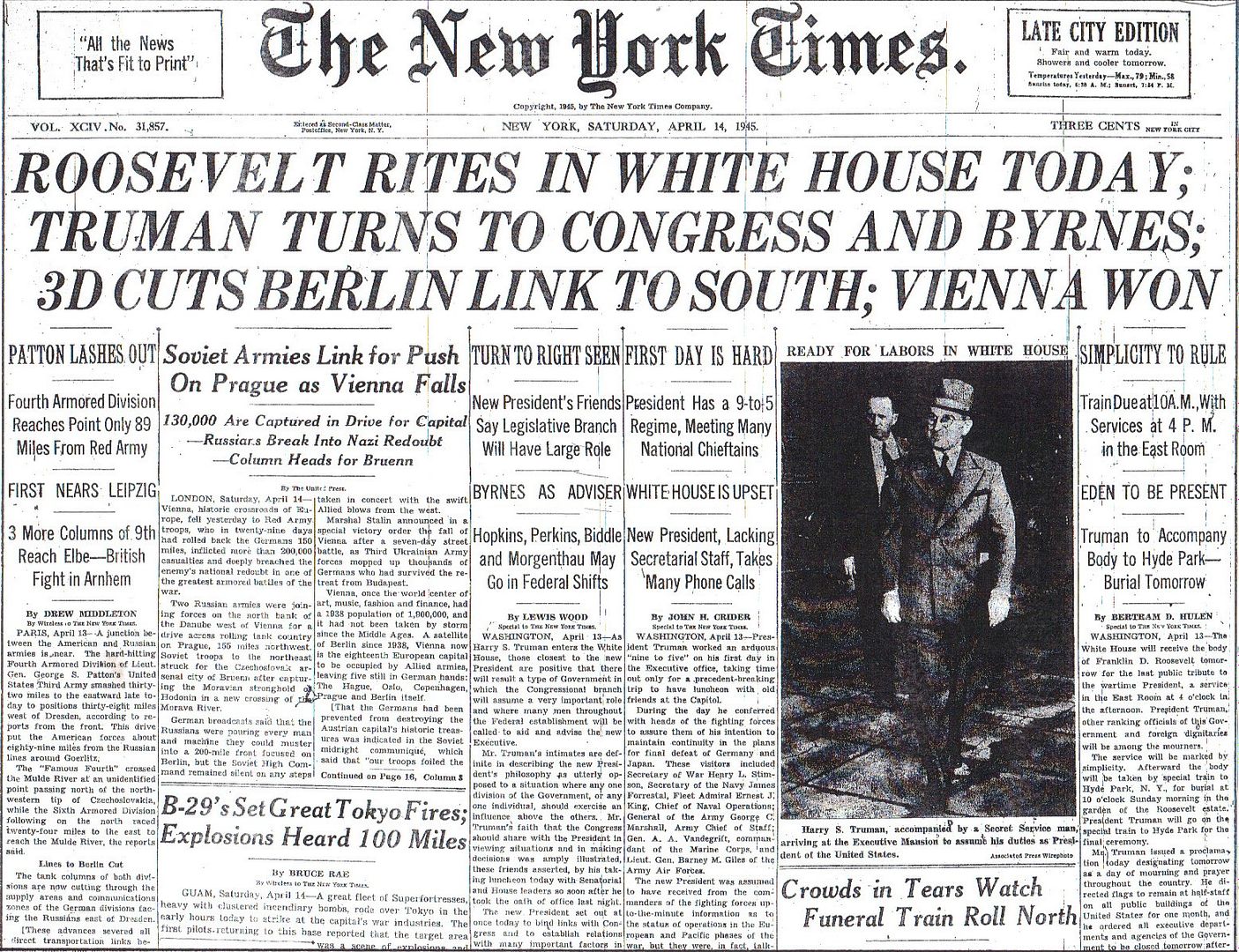
Posted on 04/14/2015 4:52:39 AM PDT by Homer_J_Simpson

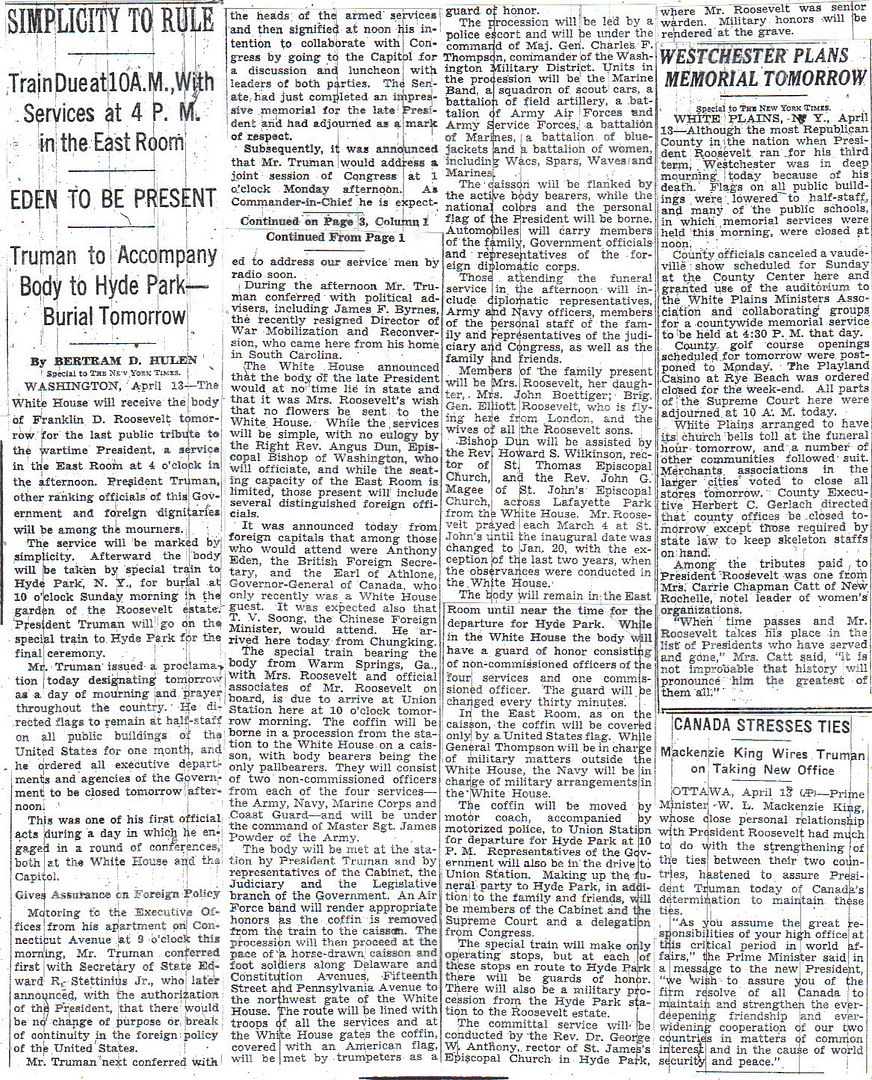
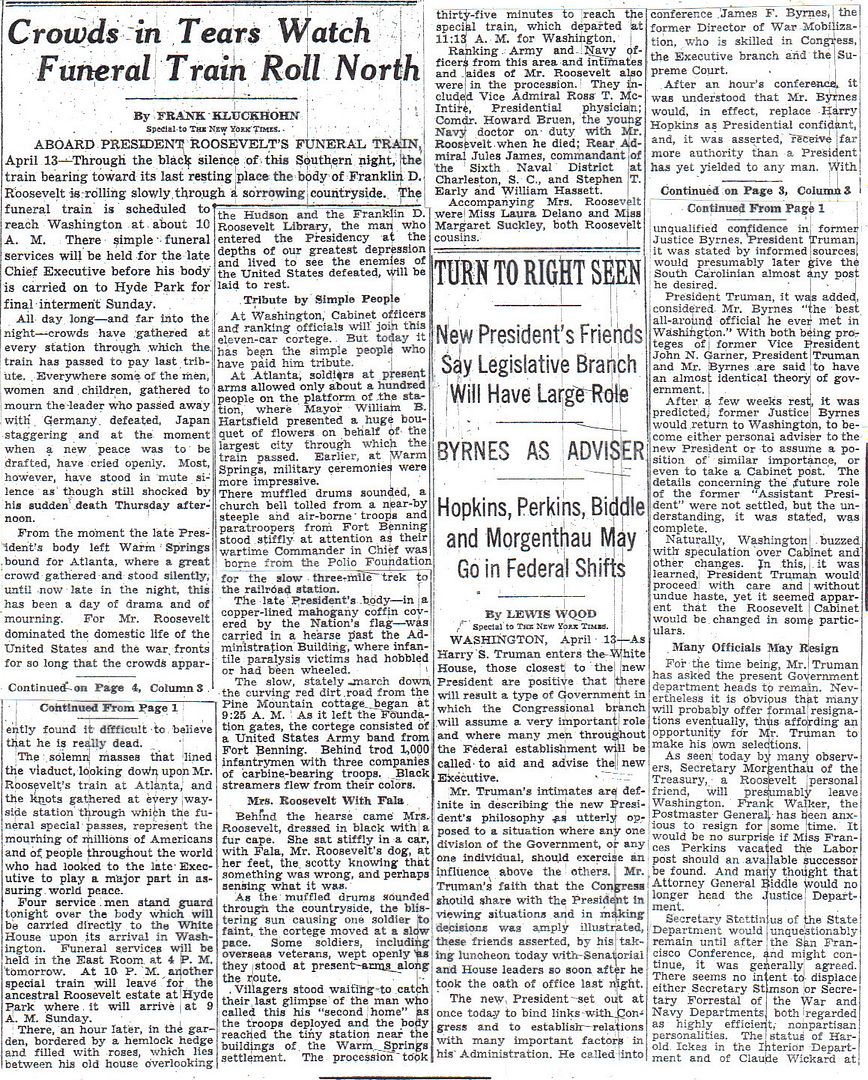
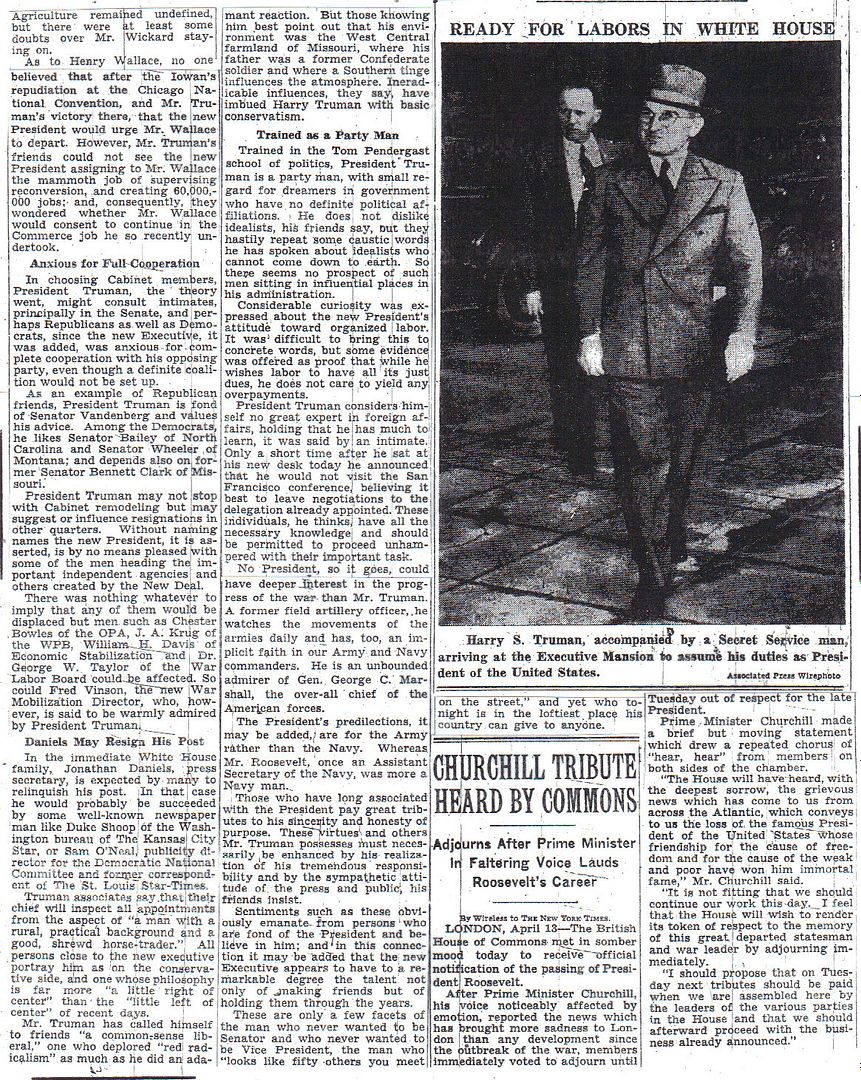
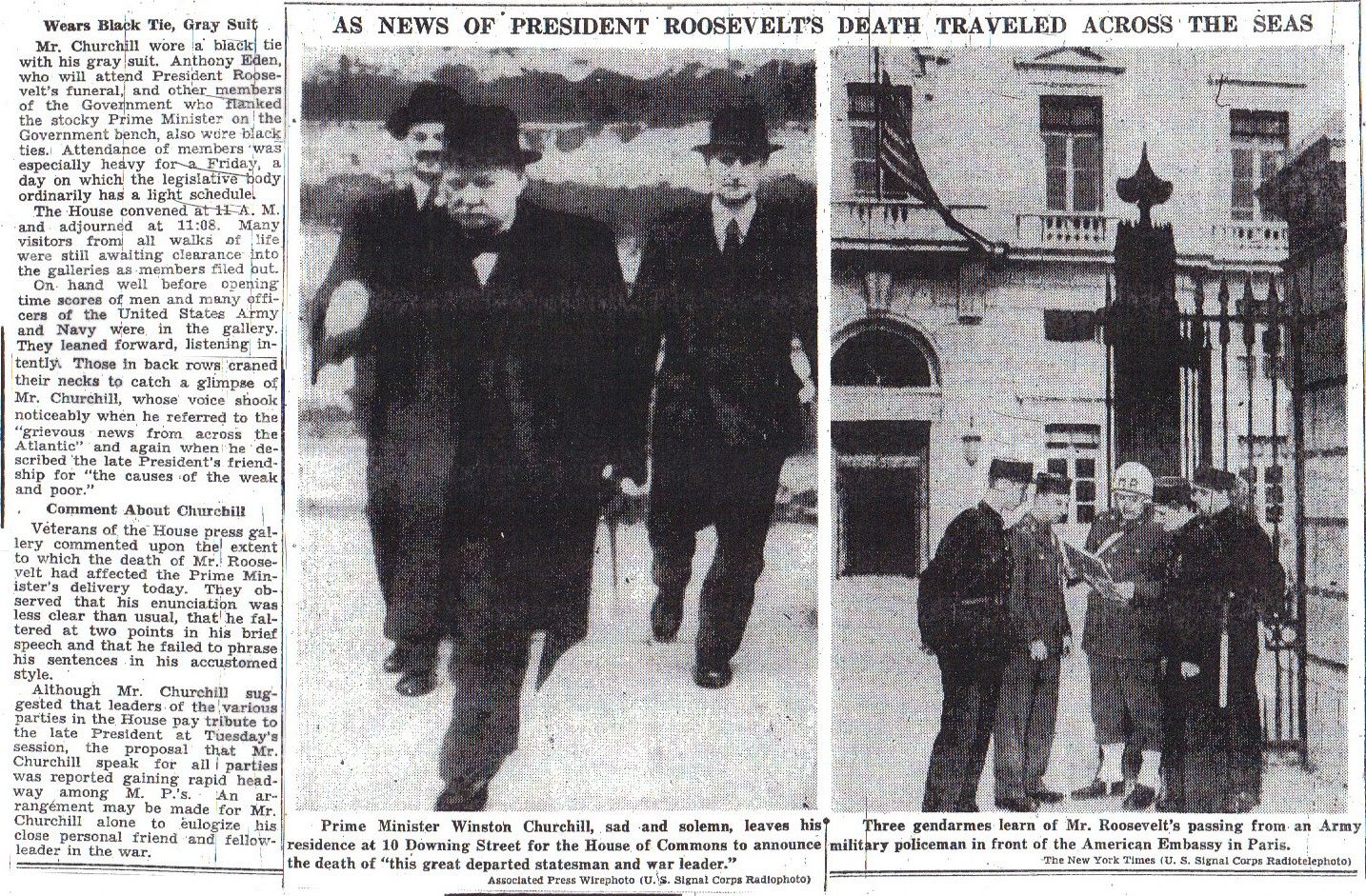
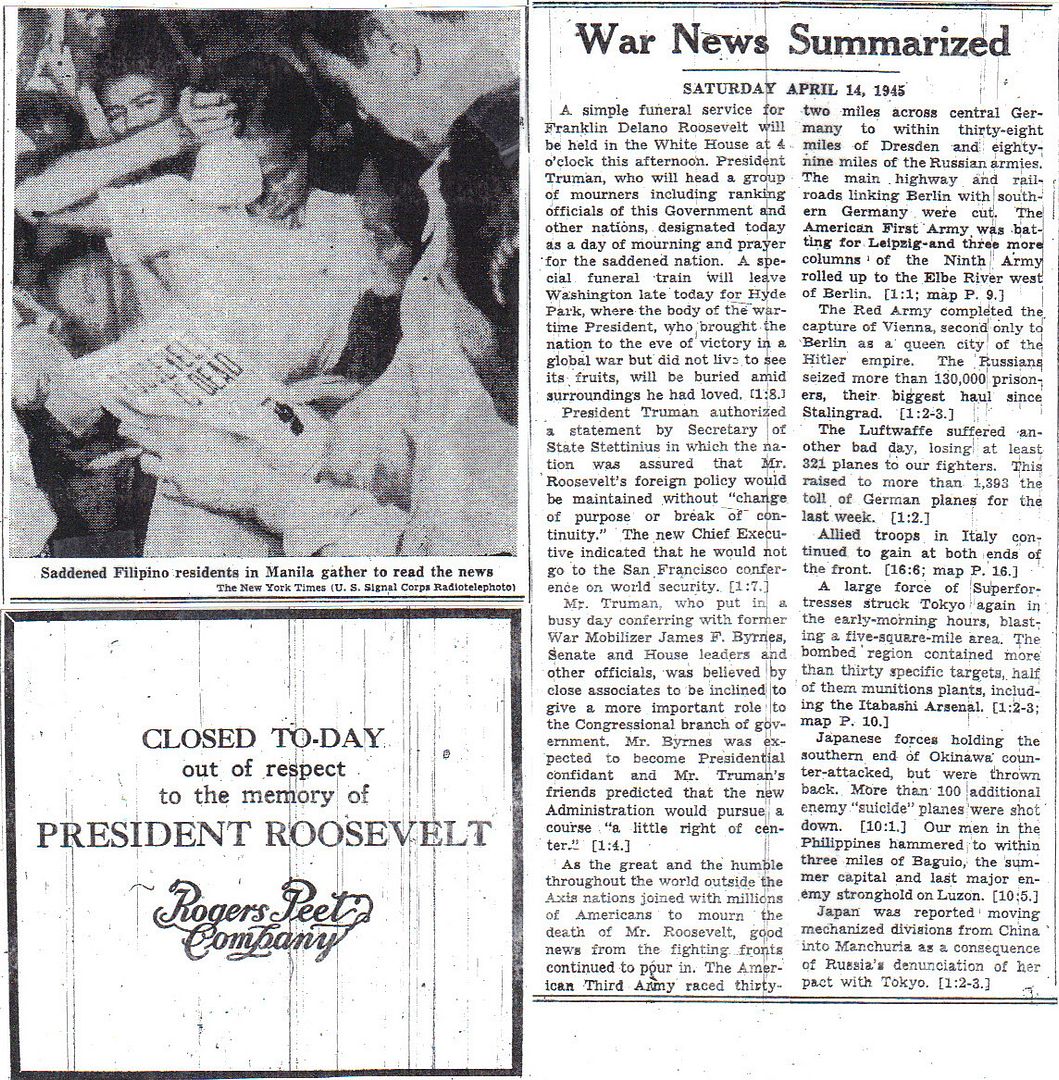
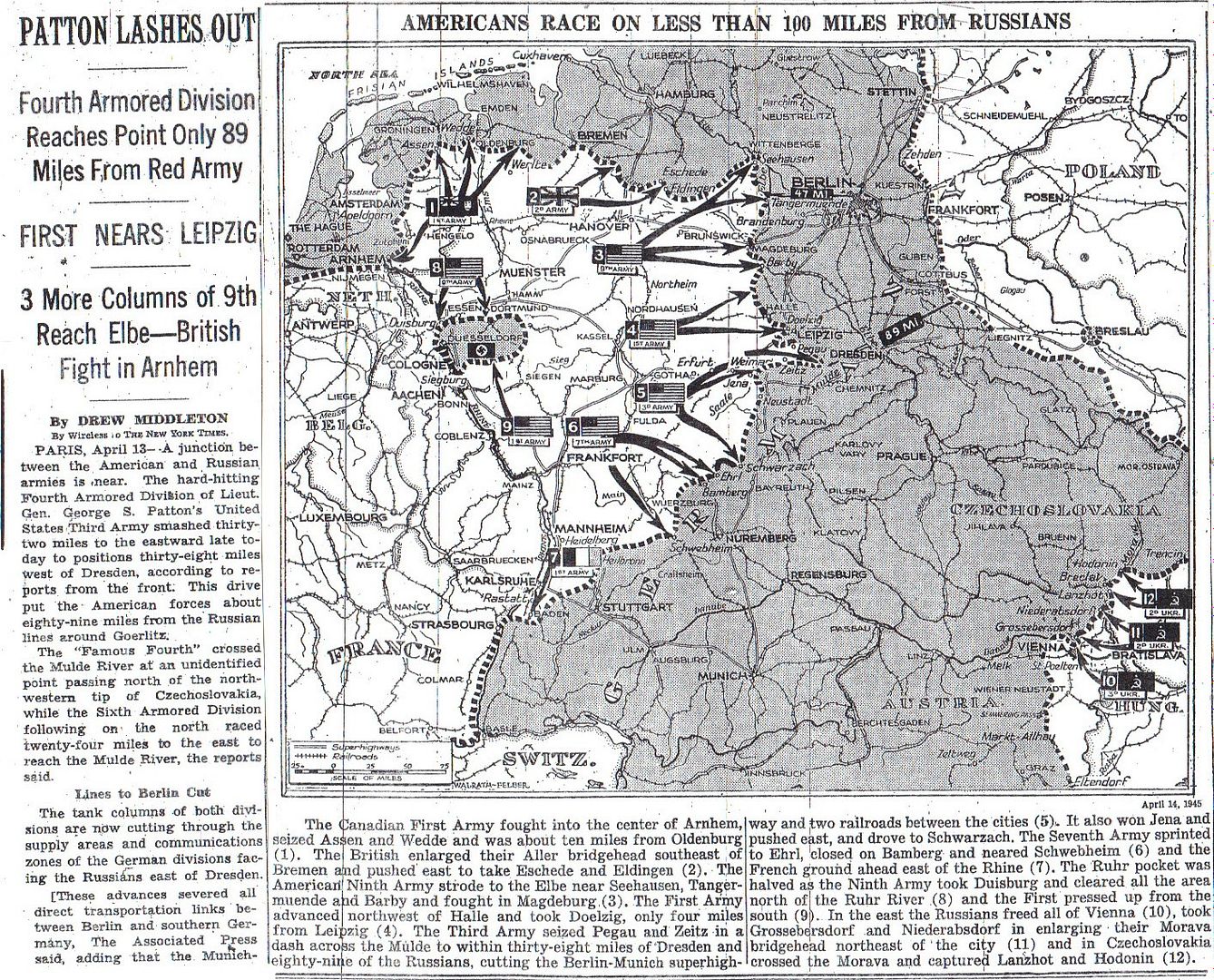
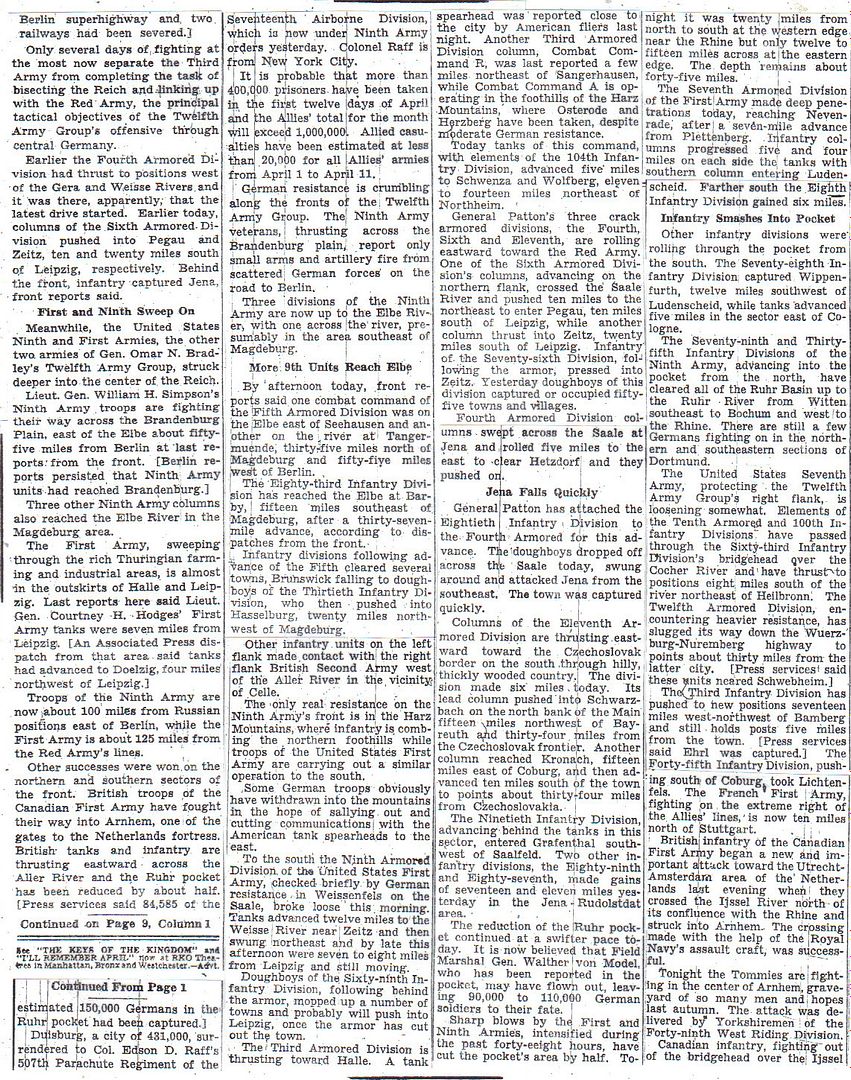
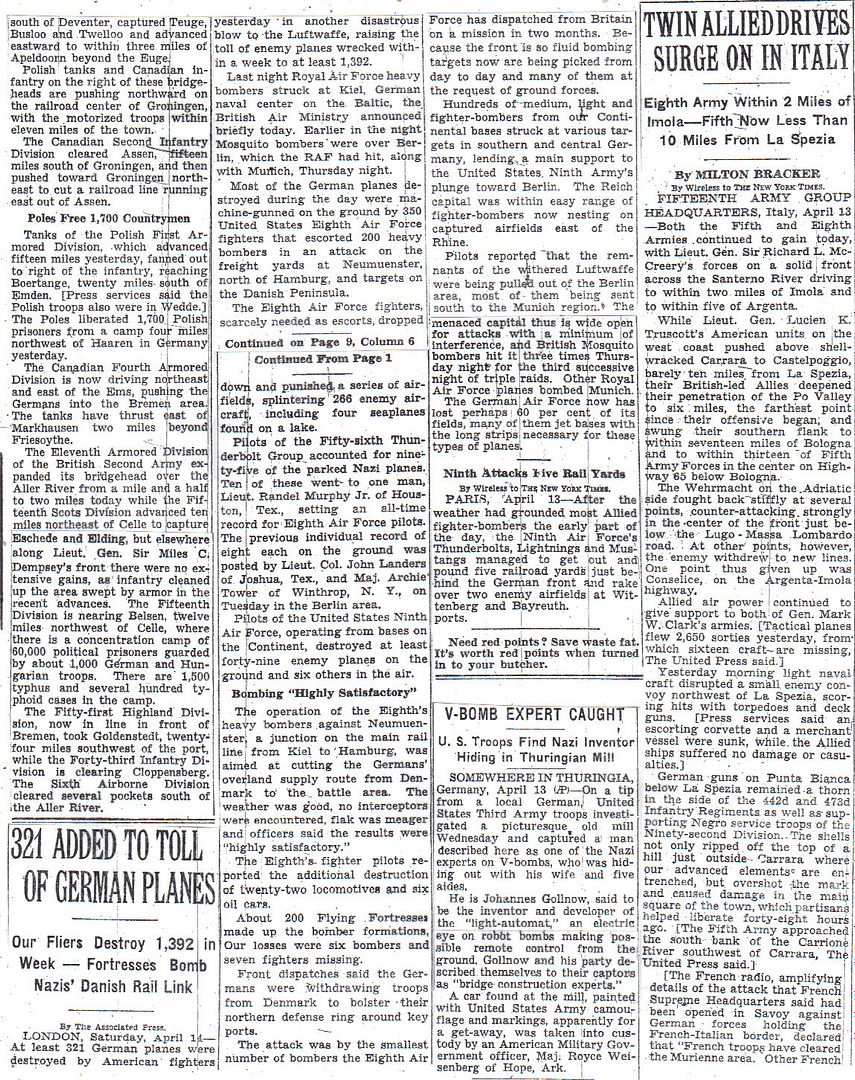
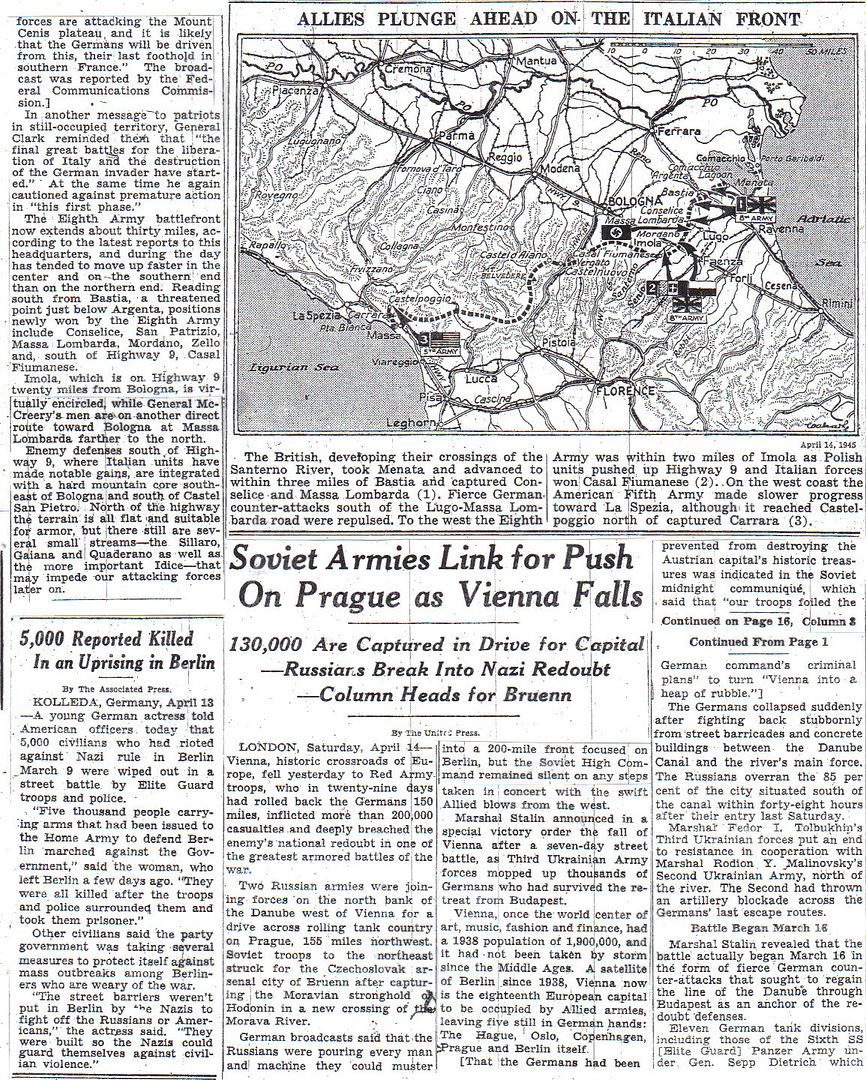
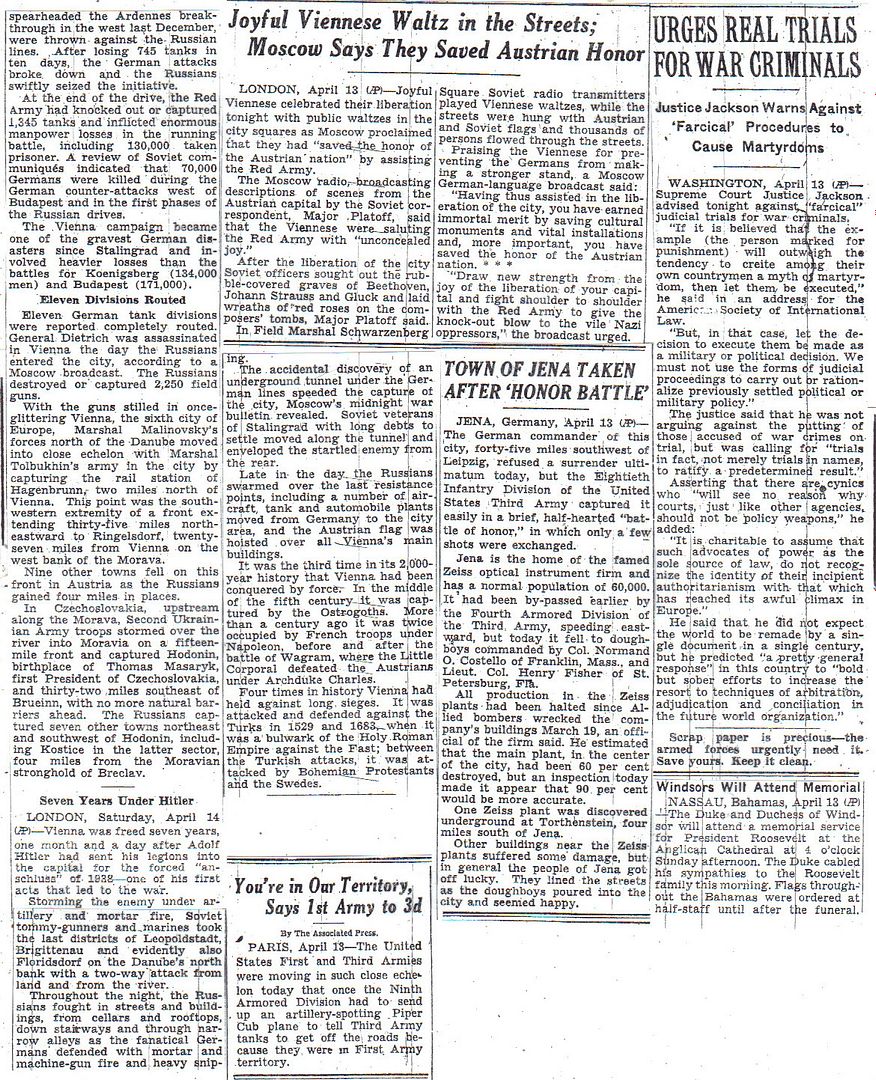
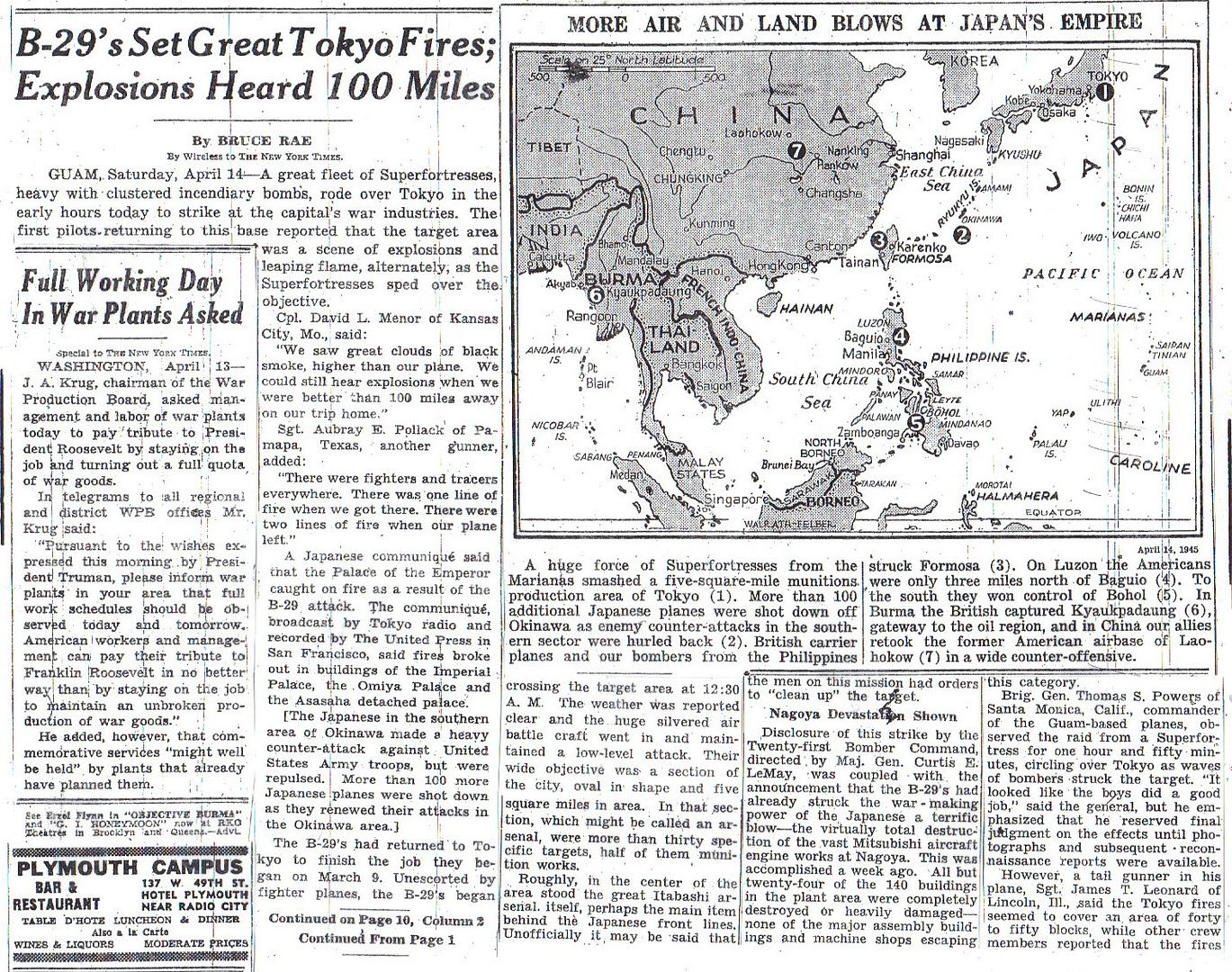
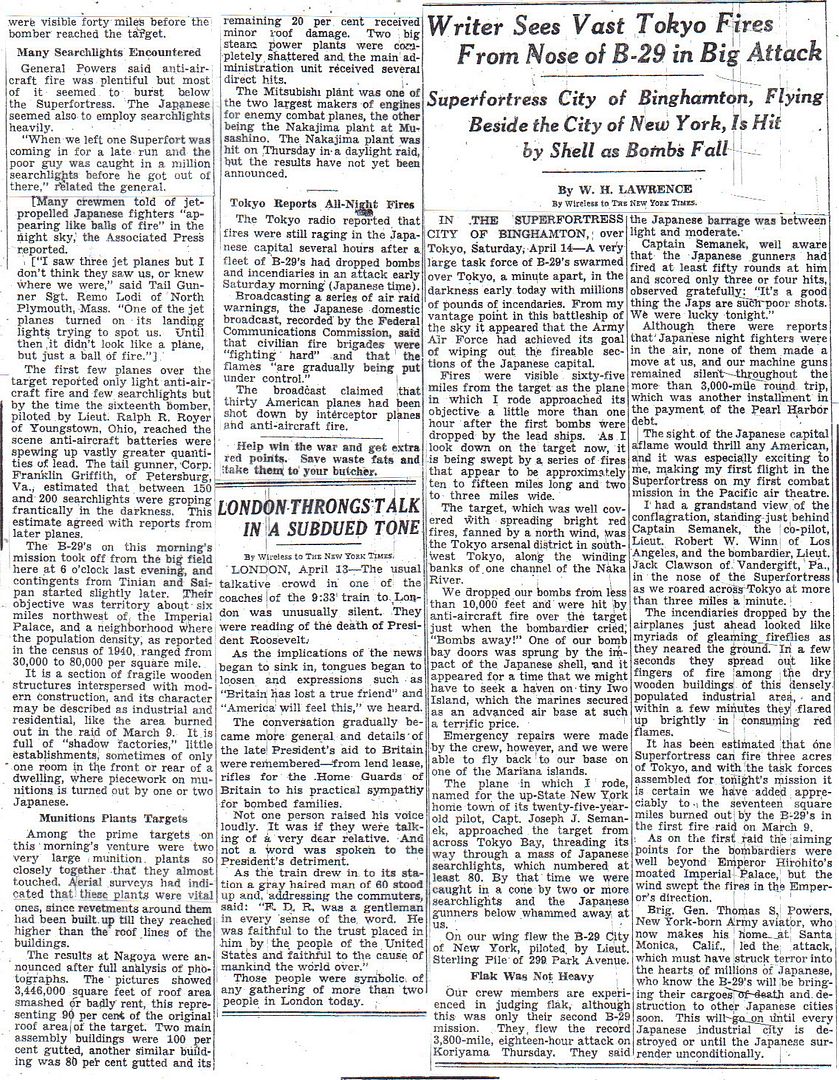
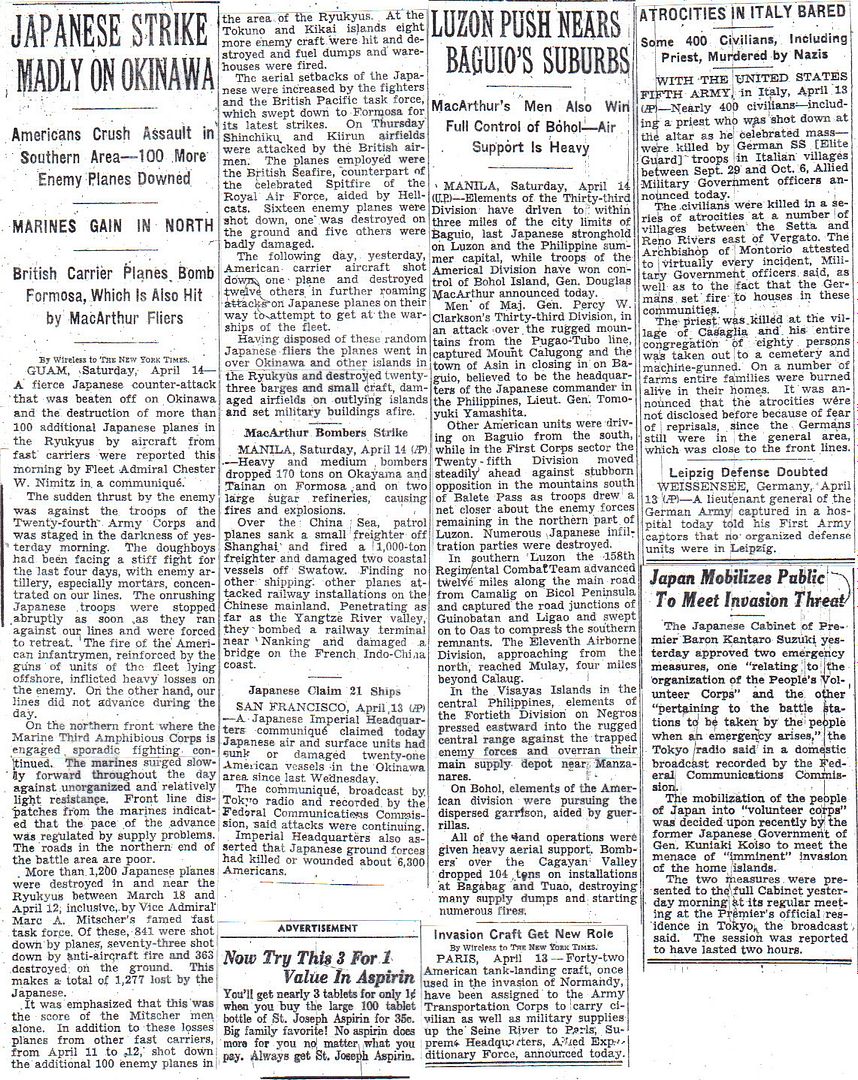
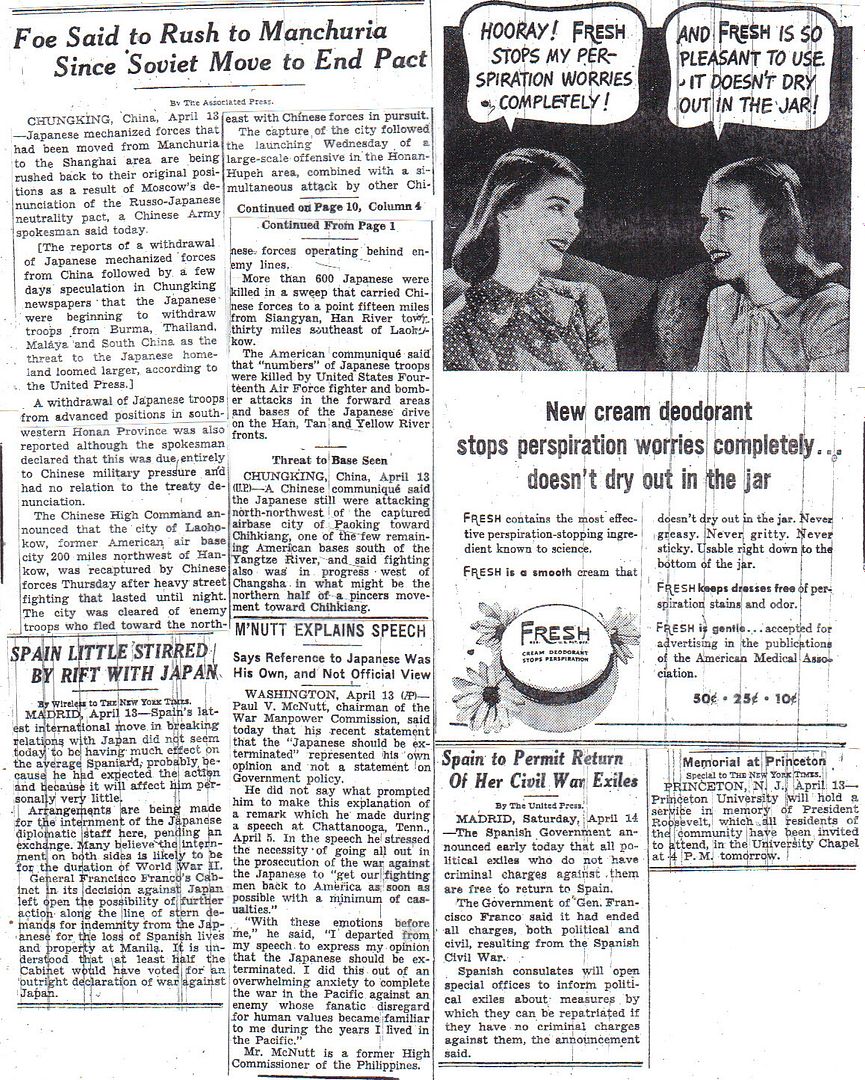
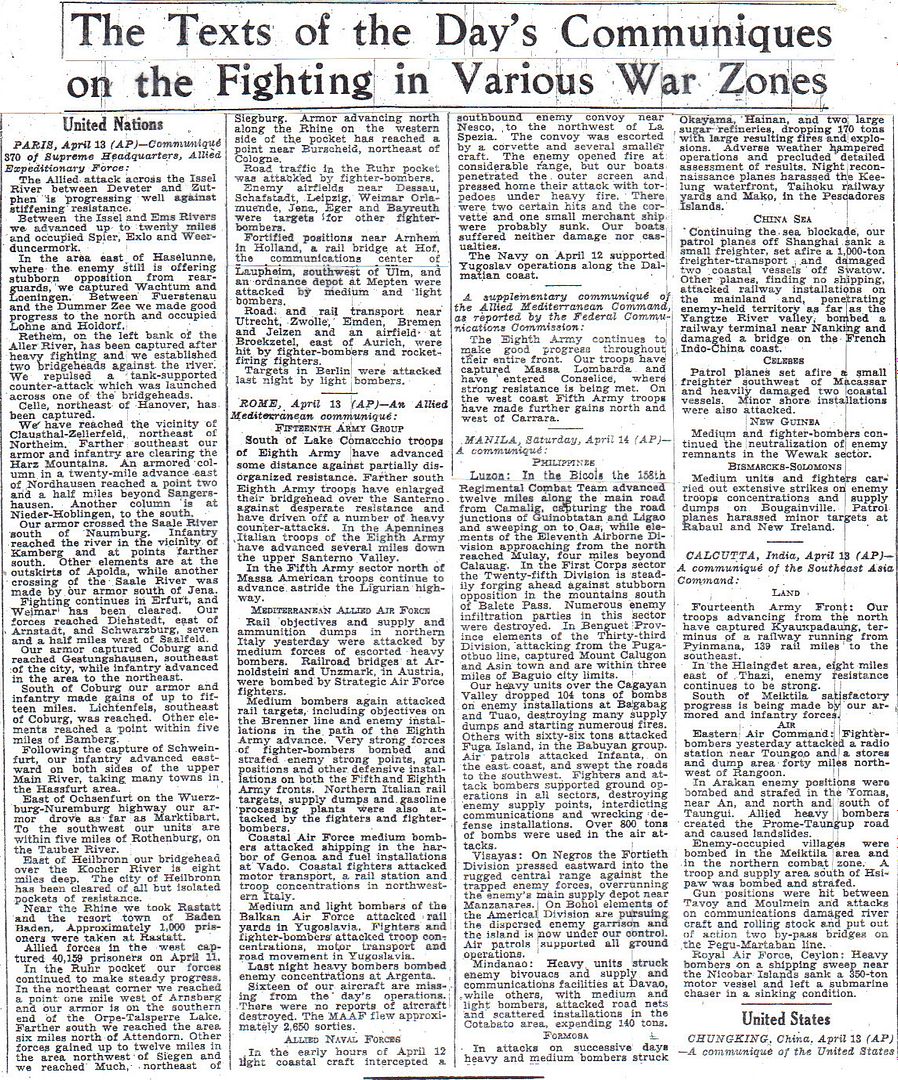
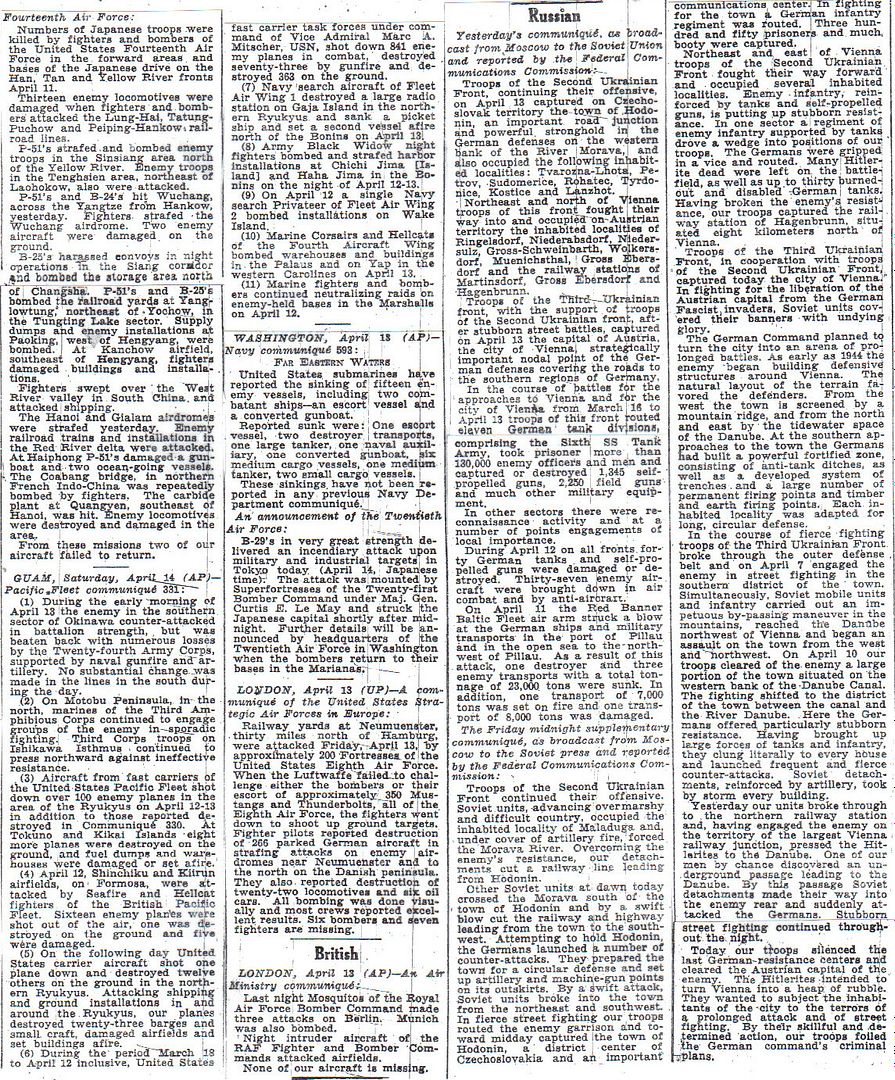
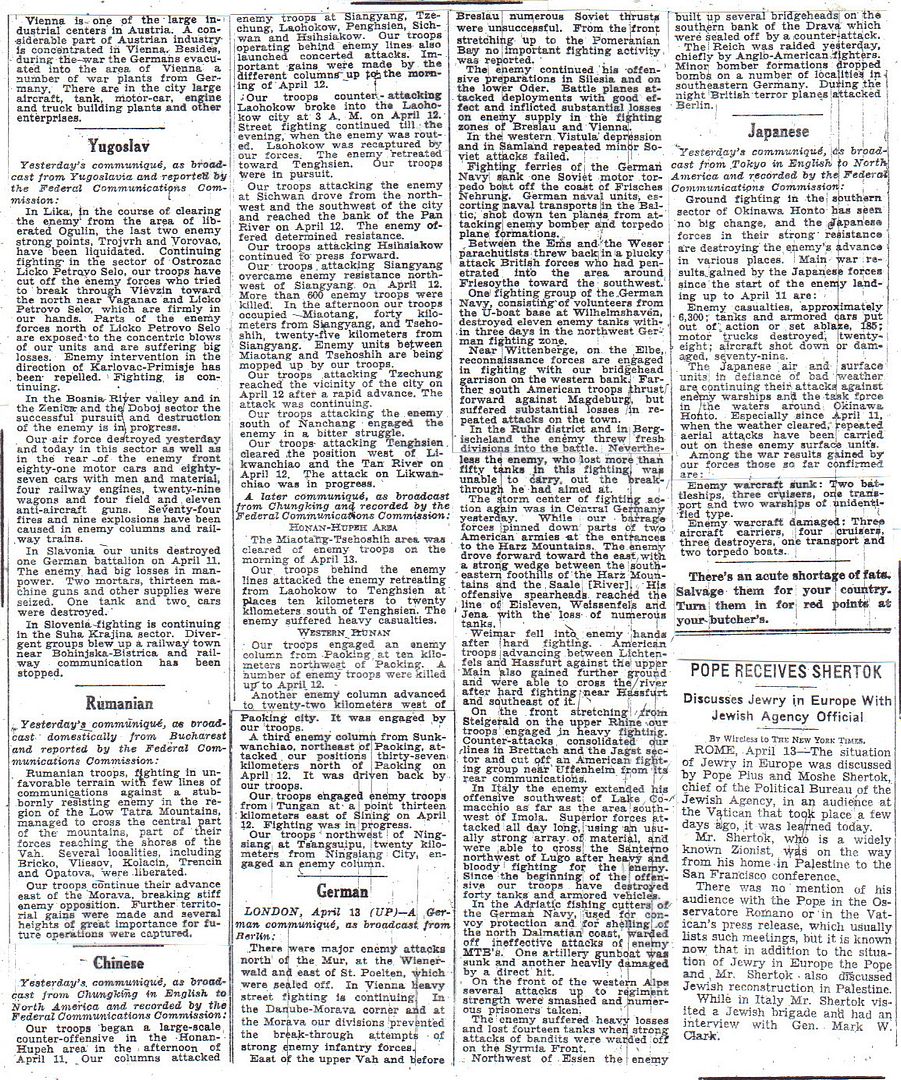
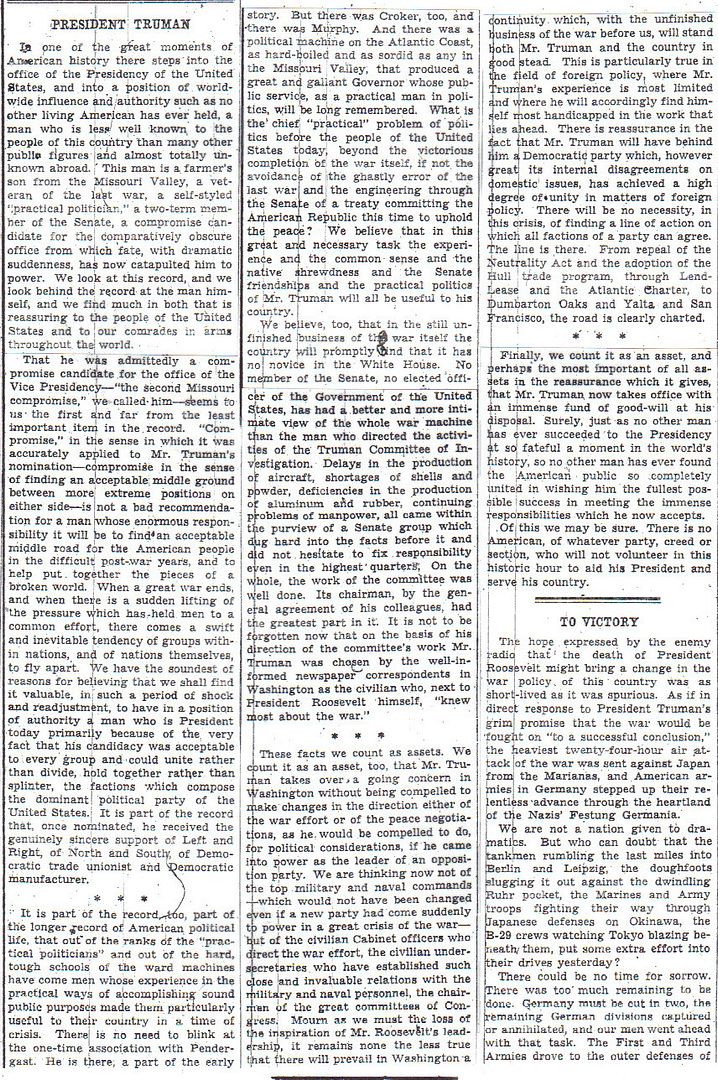
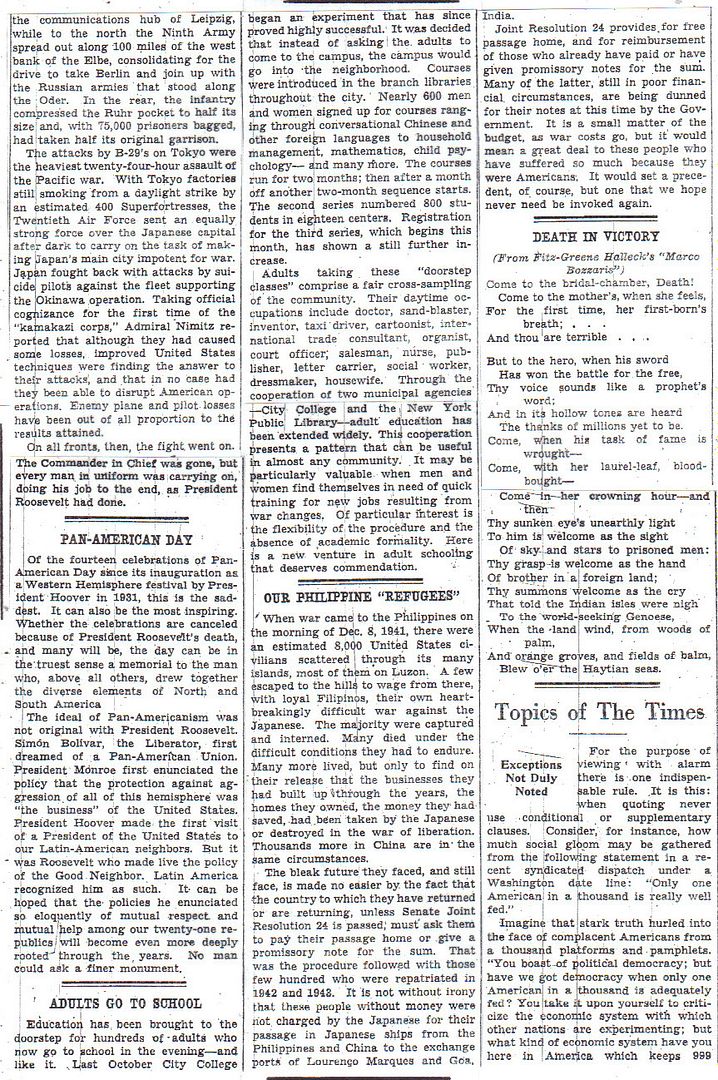
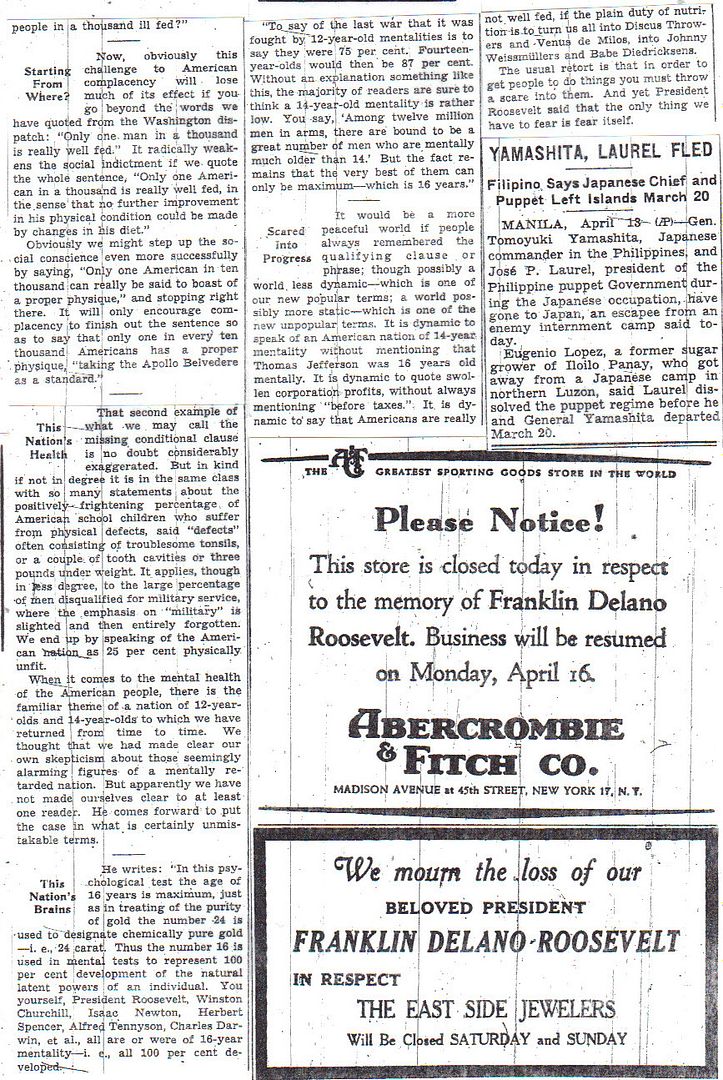
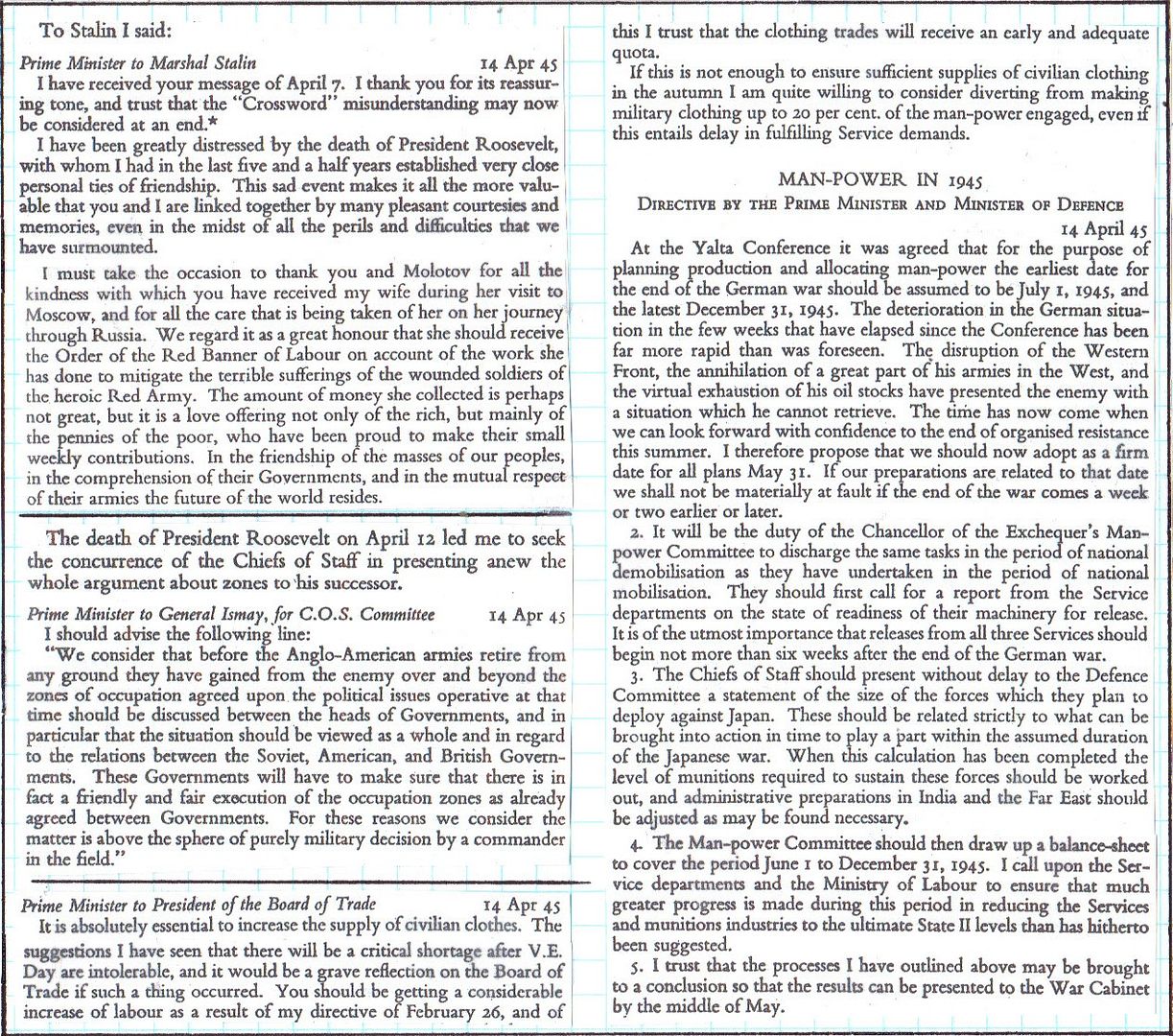
Winston S. Churchill, Triumph and Tragedy
#1 - “My Dreams are Getting Better All the Time” - Les Brown, with Doris Day
#2 - “Candy” - Johnny Mercer, with Jo Stafford and the Pied Pipers
#3 - “Rum and Coca-Cola” - Andrews Sisters
#4 – “My Dreams are Getting Better All the Time” - Johnny Long, with Dick Robertson
#5 - “I’m Beginning to See the Light” - Harry James, with Kitty Kallen
#6 – “My Dreams are Getting Better All the Time” - Phil Moore Four
#7 – “Just A Prayer Away” – Bing Crosby and Ethel Smith
#7 – “There! I’ve Said It Again” – Vaughn Monroe
#8 - “Dream” - Pied Pipers
#9 - “I’m Beginning to See the Light” - Duke Ellington, with Joya Sherrill
#10 - “A Little on the Lonely Side” - Frankie Carle, with Paul Allen
Editorials – 19-21
President Truman
To Victory
Pan-American Day
Adults Go to School
Our Philippine “Refugees”
Death in Victory
Topics of the Times
http://www.etherit.co.uk/month/3/14.htm
April 14th, 1945 (SATURDAY)
FRANCE: A series of French attacks on remaining German positions begins today and will last for 6 days. The area is in the south-west at Royan, in the Gironde estuary. The French battleship Lorraine provides bombardment support for these attacks.
The Eighth Air Force flies Mission 948: 1,167 bombers are dispatched without escort to visually attack enemy pockets on the Gironde estuary; 2 B-24s are lost; other Allied Air Forces and French naval units attack similar targets; the air attacks precede a ground assault by a French detachment of the Sixth Army Group on the defence pockets which deny the Allies use of port facilities in the Bordeaux area:
- 480 B-17s hit 15 strongpoint’s and flak batteries in the Bordeaux/Royan, Pointe Coubre and Pointe Grave areas without loss.
- 315 B-24s hit 12 strongpoints and flak batteries in the same area as Force 1 above; 2 B-24s are lost.
- 338 B-17s attack 4 strongpoints and flak batteries in the Bordeaux/Royan area without loss.
NETHERLANDS: A French Canadian Soldier attacks and liberates ALONE the city of Zwolle in the Netherlands. The soldier is Private Léo Major, DCM & Bar. He was a scout and a sniper. (Jocelyn Major Proud Son of Léo Major, DCM & Bar)
GERMANY: Himmler orders that no prisoners at Dachau concentration camp “shall be allowed to fall into the hands of the enemy alive.”
“A handover is out of the question. The camp must be evacuated immediately. No prisoner must be allowed to fall into the hands of the enemy alive,” says a handwritten note, apparently referring to Dachau concentration camp. It is signed by Gestapo chief Heinrich Himmler and dated April 14, 1945.
Central GERMANY: With Patton’s Third Army thrusting through the Thuringian Forest to Dresden and Leipzig, the gap between the Americans and the Russians is closing rapidly and Germany is being sliced in two. There are fears that Hitler may attempt a last-ditch defence in the southern redoubt based on Berchtesgaden. French and American troops are closing on the Danube before crossing into Bavaria. In the north, the British are moving on Bremen, Hamburg and Wilhelmshaven to forestall any attempt to mount a defence of the ports.
Relentless Allied air attacks on Germany are wiping out the Luftwaffe on the tarmac and the Kriegsmarine in harbour. Figures show that 1,738 enemy aircraft were destroyed in a week’s attacks on 59 airfields. A total of 332 were shot down in air combat. Many German planes are limited by a lack of fuel.
18 Ninth Air Force B-26s fly a leaflet mission in the Ruhr area; fighters fly patrols, sweeps, and armed reconnaissance, and support the US 3d Armored Division southwest of the Elbe/Mulde River junction near Dessau, the 9th Armored Division in the Borna and Lobstadt area, XX Corps elements which continue to arrive at the Zwickauer Mulde River, the VIII Corps along the Weisse Elster River south of Gera, XII Corps elements in the Bayreuth area, the 2d and 5th Armored Divisions along the Elbe River in the Barby-Magdeburg and Tangermunde areas.
29 Fifteenth Air Force P-38s bomb and strafe railroad targets in the Munich and Regensburg-Linz, Austria areas.
AUSTRIA: Fifteenth Air Force bombers attack the Klagenfurt marshalling yard as a target of opportunity.
The Taifun Express, rocket and missile train arrives at Linz. (Sandy Bybee)
ITALY: During the night of 13/14 April, Twelfth Air Force A-20s and A-26 Invaders continue to hit communications in the Po Valley; bad weather over the northern part of the Brenner line prevents medium bomber attacks but the B-25s, escorted by 54 Thirteenth Air Force P-51s, hit alternates on the southern part of the line at Salorno, San Ambrogio di Valpolicella, and Chiusaforte, bomb gun emplacements southeast of La Spezia in support of the US Fifth Army, and hit 5 defensive positions along the British Eighth Army front in the Argenta area; fighter-bombers concentrate on supporting Fifth Army forces southwest of Bologna.
318 Fifteenth Air Force B-17s and B-24s hit ammunition factories at Avigliana, Spilimbergo, Malcontenta, and Palmanova, and a motor transport depot at Osoppo; 158 fighters provide escort.
U.S.S.R.: Moscow: The scene is now set for the Red Army’s assault on Berlin. The victorious marshals, Zhukov, Konev and Rokossovky, are drawn up in overwhelming strength, ready to attack. Zhukov and Konev dislike one another, and there is keen rivalry between them for the honour of taking the German capital. Elsewhere, the Russians are slackening their advance. East Prussia is now harmless. Vienna has fallen. Graz is threatened. But it seems as if the Russians are holding their breath in readiness for the last 40-mile march on Berlin. It will be a desperate affair.
JAPAN: On Okinawa, the 4th and 29th Marines launched a coordinated attack on the Motobu Peninsula inland in an easterly direction and west and southwest from the centre of the peninsula, respectively. (Richard Gaines)
Kamikazes damage battleship USS New York (BB-34) and destroyers USS Sigsbee (DD-502), USS Dashiell (DD-659), and USS Hunt (DD-674).
Carrier-based F6F Hellcats, FM Wildcats and F4U Corsairs shoot down 45 Japanese aircraft near the ships of Task Force 58.
The aircraft carrier HMS Formidable joins the RN’s Task Force 57 replacing HMS Illustrious which is ordered to retire for an overhaul.
PACIFIC OCEAN: Japanese vessels sunk at sea:
- Submarine USS Gabilan (SS-252) attacks a Surabaya-to-Makassar convoy, sinking a cargo vessel and an auxiliary submarine chaser.
- Submarine USS Tirante (SS-420) attacks Japanese convoy MOSI-02 in the approaches to the Yellow Sea, sinking a transport, an escort vessel, and a coast defence vessel west of Quelpart Island. For his skill and daring in carrying out this surface attack through mined and shoal-obstructed waters, Lieutenant Commander George L. Street III, Tirante’s captain, will receive the Medal of Honor.
- An aircraft sinks an auxiliary submarine chaser off French Indochina.
- An aircraft sinks a merchant cargo ship near Rima Island.
COMMONWEALTH OF THE PHILIPPINES: 24 Seventh Air Force B-24s based on Angaur Island, Palau Islands, bomb supply and personnel areas at Tigatto.
Far East Air Forces B-24s, B-25s, A-20s, and fighter-bombers fly numerous strikes in support of ground forces and against airfields, gun positions, defences, and troop concentrations throughout Luzon, Cebu, Negros, and Mindanao Islands.
SBDs from Marine Aircraft Group 24 flew the last Marine aviation mission on Luzon, in support of the 37th Army Division. (Richard Gaines)
JAPAN: Tokyo: Not a building is left standing in ten square miles of Tokyo after a four-hour fire-bomb raid last night by 327 USAAF B-29s. Where yesterday there were wooden homes, workshops and munitions factories, there is only smoking rubble in which thousands are feared to have died. The imperial palace was also damaged. The fire-storm started as 2,139 tons of incendiaries filled with jellied petrol set buildings burning so fiercely that all air was consumed, creating strong winds that spread the fire further - until there was nothing left to burn.
BURMA: 41 Tenth Air Force P-47s and P-38s attack troops, supplies, and fuel dumps at Tawnghkam Nawng-hkam, Mong Kung, Loi-makhkawn, and Nawngkaw; 8 P-38s damage bridges at Kong pau and Kyawngteng; 446 transport flights are flown to forward areas.
CHINA: 24 Fourteenth Air Force B-24s, supported by 12 P-51s, bomb Loyang and knock out a bridge over the Yellow River; 30+ B-25s and 130+ fighter-bombers attack bridges (knocking out at least 6), river, road, and rail traffic, troops, storage areas, town areas, and general targets of opportunity over the vast expanse of southern and eastern China.
Far East Air Forces B-25s sweep the Canton-Hong Kong waterways, hitting shipping and other targets.
FORMOSA: Far East Air Forces B-24s bomb four airfields.
I find it interesting that FDR was buried on April 15th.
"The end of the war provided survivors, at last, with the opportunity to grieve for those whom they had lost to the Nazi death factories.
Scenes such as this one from Nordhausen were quite common.
This Polish boy mourns his dead grandmother while his father prays over her body."
"Forsaken humanity: The painter Gideon impressionistically captures the surreal horrors that greeted Allied troops who liberated concentration camps as they drove eastward."
"The dirty bandages on the face of this Bergen-Belsen survivor provide evidence of the abuse she received during her imprisonment.
Many of the camp's "survivors" continued to die even after the camp's liberation.
A British soldier remembered that many of the former inmates "collapsed as they walked and fell dead."
About 14,000 prisoners died from April 15 to June 20."
"The Allies often ordered the local population to exhume the bodies of prisoners killed in concentration camps or on death marches for proper burial, especially in cases such as this one in Helmbrechts, Germany, where female slave laborers from Eastern Europe had been buried in locations that were not well hidden."
"These recently rescued Jewish women had been slave laborers in a munitions factory in Kaunitz, Germany.
The yellow crosses painted on their clothing had made them easily identifiable to the local German population, thereby decreasing the possibility of escape."
"The liberation of the concentration camps in Germany unleashed a torrent of information regarding the Nazis' treatment of the Jews.
News reports focused on the mountains of corpses (including those pictured at Gotha, Germany), the horror and stench of the camps, and the surreal, skeletal figures who remained alive.
Although news stories about the systematic mass murder of European Jewry had appeared in the Western media since 1942, virtually nobody had imagined the scenes that lurked behind the barbed-wire fences of Nazi camps.
"Reporting from Buchenwald, CBS radio correspondent Edward R. Murrow offered the following description:
'There surged around me an evil-smelling stink.
Men and boys reached out to touch me.
They were in rags and the remnants of uniforms.
Death already had marked many of them, but they were smiling with their eyes....
Murder had been done at Buchenwald.
God alone knows how many men and boys died there during the last 12 years.'
"Well-intentioned reports such as this led people to mistakenly believe that the genocidal programs of the Nazis had taken place in Germany only.
Many years elapsed before the full details of the 'Final Solution' were pieced together and people were able to more accurately interpret the events of the Holocaust."
Fitting, ain’t it?
I can remember watching a number of years back a documentary on the death camps and the Allied liberation of them. There was one incident that the documentary mentioned that I will always remember (don’t understand why I do, but).
Apparently, during the liberation of one of the camps, a senior SS officer was standing around while the Allied soldiers were going about their business in the camp, sorting things out, etc. This SS officer began smiling and laughing at the whole gruesome thing and almost instantly, an Allied soldier just simply pulled out his pistol and blew the SS officer away on the spot. Sorry, but for me a moment like this will always stay with me when thinking about that unspeakable horror.
https://archive.org/details/ADC-4009a
“Task Force C” 104th Infantry Division, Stueden, Germany, 04/14/1945
Extracted from US Army film # 6009 “Task Force C 104th Infantry Division, Near Halle, Germany ; American Prisoners Freed By 30th Infantry Division, Colbitz, Germany, 04/14/1945”
http://marshallfoundation.org/library/digital-archive/to-general-of-the-army-dwight-d-eisenhower1/
General George C. Marshall To General of the Army Dwight D. Eisenhower, April 14, 1945
1945
Publisher: The Johns Hopkins University Press
Date: April 14, 1945
Subject: World War II
Collection: Papers of George Catlett Marshall, Volume 5: The Finest Soldier
Summary
To General of the Army Dwight D. Eisenhower1
April 14, 1945 [Radio No. W-68632.] Washington, D.C.
Restricted
Personal to Eisenhower from Marshall.
Dear Eisenhower:
It is becoming increasingly apparent that the task of readjusting the Army and promptly releasing to civilian life those people who are surplus to the needs of the Japanese war is one which will demand the most unselfish and conscientious efforts on the part of everyone. I fear that the weight of public opinion in the United States will be such that unless the task is handled properly, we may be forced to take measures which will interfere with redeployment and result in a prolongation of the Japanese war.
It is important that we discharge promptly every man who can be spared. It is of equal importance that these men be selected with extreme care. I think it is very important from a psychological point of view that the first shipments of men to be demobilized should be drawn from combat troops and from the divisions deepest in Germany,2 resorting to air transport service to get them to points of ship embarkation, if necessary.
The manner of selecting and preparing units for redeployment is also of critical importance. Upon the conclusion of World War I, it was too often the case that the most convenient unit was the one shipped back to the United States for demobilization at the expense of a unit which was more deserving. This must not happen again. Furthermore, even though it involves a lot of hard staff work and inconvenience to commanders all the way down the line, those units which are shipped direct to the Pacific theaters must contain to the maximum extent practicable only those people who are least eligible for discharge.
I have in mind that many units can be maintained considerably below authorized strength without harm to your military requirements. Those for reshipment through continental United States can be filled up with replacements here.
I wish that at the proper time you would advise all your people of my deep personal concern as to the responsibility of all commanders for a thorough and intelligent application of our readjustment and redeployment regulations. The Army will be severely criticized unless everyone gives his best efforts to this problem. Also please see that staffs do not get too much into blue print designs without sufficient thought for human reactions.3
Document Copy Text Source: Records of the War Department General and Special Staffs (RG 165), Records of the Operations Division (OPD), 370.9, Case 127, National Archives and Records Administration, College Park, Maryland.
Document Format: Typed radio message.
1. This message was also sent to General Joseph T. McNarney. (Marshall to McNarney, Radio No. W-80438, April 14, 1945, NA/RG 165 [OPD, 370.9, Case 127].)
2. The message to McNarney reads instead: “divisions deepest in Italy.” (Ibid.)
3. “I share your concern over the human problem involved in redeployment,” replied Eisenhower. “I recognize that these problems must be solved promptly and with human understanding if the Army is to retain the confidence of the people at home for the continuation of the war against Japan as well as for the future. Our soldiers must be convinced that the system is fair and impartial.” Transfer of troops was under study at his headquarters, where a control group was to give “undivided attention to assure a complete coordination of effort and to give appropriate consideration to the human element.” (The Papers of Dwight David Eisenhower, ed. Alfred D. Chandler, Jr., et al., 21 vols. [Baltimore: Johns Hopkins University Press, 1970-2001], 4: 2621-22.) See Marshall Statement to the Troops, May 8, 1945, Papers of George Catlett Marshall, #5-118 [5: 173].
Recommended Citation: The Papers of George Catlett Marshall, ed.Larry I. Bland and Sharon Ritenour Stevens(Lexington, Va.: The George C. Marshall Foundation, 1981- ). Electronic version based on The Papers of George Catlett Marshall, vol. 5, “The Finest Soldier,” January 1, 1945-January 7, 1947 (Baltimore and London: The Johns Hopkins University Press, 2003), pp. 143-144.
Collection
Papers of George Catlett Marshall, Volume 5: The Finest Soldier
http://www.historylink.org/index.cfm?DisplayPage=output.cfm&file_id=10734
Wilburn K. Ross is awarded the Medal of Honor on April 14, 1945.
On April 14, 1945, Wilburn K. Ross is awarded the Medal of Honor. During a battle in France (World War II) in 1944, Private Ross, with a light machine gun, held back nine German counterattacks. With deadly fire and staying his forward position after running out of ammunition, he kept the counterattacks from reaching his company. His Third Infantry Division unit had been greatly weakened by earlier attacks. Private Ross’s heroic acts broke the counterattacks and saved his unit. After the war, Ross became a career soldier. He retired in 1964 to DuPont, Washington, where he has lived ever since. A memorial plaza in DuPont honors his valor and service to the nation.
From Farm to Battlefield
Wilburn Ross grew up on a farm near Strunk, Kentucky. He worked in the coal mines and then with the coming of World War II became a welder at a shipyard. In November 1942 he was drafted into the United State Army.
Following stateside training, Private Ross went overseas. He served in the Third Infantry Division and had his first combat action in North Africa in March 1943. During the war, he spent 26 months in combat and was in five campaigns in North Africa, Sicily, Italy, France, and Germany.
Heroic Actions
He was awarded the Medal of Honor for his heroic actions on October 30, 1944, near St. Jacques, France. At 11.30 on that morning his company came under intense German counterattacks. They had already lost 55 of their 88 men in their attacks on a well-entrenched German position held by an elite unit. Going on the defense, his company established positions in anticipation of German counterattacks.
Private Ross placed his light machine gun 10 yards in front of his company’s riflemen. He was forward to absorb the initial impact of the enemy counterattack. As the counterattack arrived Private Ross came under heavy fire. He maintained his position, holding back seven counterattacks. By the eighth counterattack the defending riflemen had nearly exhausted their ammunition. Eight riflemen crawled to Ross’ position and got from him some ammunition. The German troops had also crawled toward Private Ross and hurled hand grenades at his position.
Private Ross stopped the enemy with accurate and deadly fire until his ammunition ran out. He was told to withdraw, but ammunition resupply was expected, so remained. Fresh ammunition arrived just as the German forces prepared to overrun the defenses. Ross loaded his machine gun and laid deadly fire on the Germans as they hit his position. During the counterattacks he killed or wounded 58 Germans, breaking their assault. Private Ross remained at his position through the night and the next day, spending 36 hours in defense. His actions throughout this engagement were an inspiration to his comrades.
He was awarded the Medal of Honor in a ceremony at a former German memorial stadium in Nuremberg, Germany, on April 14, 1945. In the ceremony five Third Infantry Division soldiers were awarded the Medal of Honor. During the war Private Ross was wounded three times. His other medals include the Purple Heart, awarded three times; Distinguished Unit Citation; and distinguished French decoration.
Ross was discharged on June 1, 1945, and returned to Kentucky. He worked for the Kentucky Highway Authority, but after two years as a civilian rejoined the military. He would make the army his career, serving at various posts. He would fight in another war, the Korean War.
Korean War and Cold War Duties
While stationed at Fort Lewis, Master Sergeant Ross married Monica J. Belford (1927-2011) of DuPont, Washington. He was assigned to the Second Infantry Division, which by July 1950 was preparing for combat in Korea. That month, while on maneuvers, he was injured by an explosive device that simulated shell blasts. He received burns that required a week’s recovery.
He returned to duty just as the division deployed to Korea. He was in Korea only nine days and then on his first day of combat on the Pusan perimeter he was hit by machine gun fire and received a serious leg wound. He was treated in a hospital in Japan and then returned to the United States for extensive medical treatment.
Master Sergeant Ross arrived at Madigan Army Hospital on October 11, 1950. Once he had healed, he was assigned instructor duties at the Fort Benning, Georgia, infantry center. He also served in Germany, Hawaii, and at Fort Lewis.
Master Sergeant Wilburn Ross has been honored at many events. In one of the most notable, in May 1963 he was flown from his Hawaii base to a White House reception given by President John F. Kennedy (1917-1963).
Willburn and Monica Ross called DuPont home and raised five children.
Retirement Years
On February 1, 1964, Ross retired from the army with 20 years of service. He took several jobs before becoming a patient van driver at the American Lake Veterans Hospital.
He has been active in veterans’ support and Medal of Honor activities. On July 14, 1983, he participated in a ceremony at Fort Lewis for the release of a stamp honoring those who have received the highest award for valor.
In 2013 he and another surviving World War II Medal of Honor recipient attended a November 11, 2013, Veterans Day dedication at the National World War II Memorial in Washington D.C., to unveil a new Medal of Honor stamp. The stamp had the images of 12 World War II recipients of the medal living in January 2012. By the time of the event at Washington D.C. the number was down to eight.
A monument with a plaque recalling his heroism is located at the Ross Plaza in DuPont. The plaza is on the corner of Ross Loop and Ross Avenue. These streets are named, not for Master Sergeant Ross but to honor a former DuPont police officer. A section of Highway 92 West near Strunk, Kentucky, is named the Private Wilburn K. Ross Highway.
Sources:
Donald K and Helen L. Ross, Washington State Men of Valor (Burley, Washington: Coffee Break Press, 1980); United States Senate Committee on Veteran’s Affairs, Medal of Honor Recipients, 1863-1973 (Washington, D.C.: U.S. Government Printing Office, 1973); “Hospital Lists 17 Casualties,” The Oregonian, October 11, 1950, p. 16; Bob Lane “Hero Lays Down His Sword,” The Seattle Daily Times, February 2, 1964, p. 1; “Veteran Honored for Valor,” The Oregonian, July 9, 1983, p. 76.
By Duane Colt Denfeld, Ph.D., May 18, 2014
First, in the 4th Panzer Army/1st Ukrainian Front sector, the Germans have finally spotted one of Konev’s tank armies, the 4th Tank Army, in reserve, along with a few other units. But they haven’t spotted most of Konev’s strength across the river. The Germans are also withdrawing 4th Panzer Army’s mobile reserves, consisting of the Führer Begleit Brigade and 21st Panzer Division. The German defenses along the Niesse are a pathetically weak screen of understrength infantry divisions. This map makes pretty clear why Fourth Panzer Army’s defenses will collapse so quickly when Konev attacks; those defenses were never there to begin with.
In the 9th Army/1st Belorussian Front sector, the Soviet probing attacks have begun. The German map makes it look like a full-scale assault, and in years past the strength of this attack would have been. But today, these are actually reconnaissance probes. Very strong ones. The Soviets referred to this as “reconnaissance by the fight,” the idea being that they would make battalion-sized attacks to fix the German forward strongpoints and identify German artillery fire zones. “Reconnaissance by the fight” was an inherently costly operation, and normally conducted by the penal battalions of political prisoners and “cowards” who were given the “opportunity” to atone for their crimes with their blood.
The note appended to the map is a summary of an interrogation of a prisoner from 132nd Rifle Division, and reads: According to soldier’s rumors, they should take Berlin by April 25.
In the 3rd Panzer Army/2nd Belorussian Front, Soviet reinforcements continue to arrive, and the Germans are beginning to spot specific formations.
There are some interesting notes appended to the map which I have cropped. The first note
This is a summary of an interrogation of a prisoner from 49th Rifle Division, and translates as: Told to attack in the direction of Weisenau with the main assault in about 5-10 days. Rumors among the troops are that the Americans and British will not be allowed to take Berlin. A new weapon, “Stalin’s (Patefon has no direct translation, roughly “father of all telephones”) Successfully fires 325 rounds per minute.
And finally, most interesting is this note, a summary of an interrogation of a prisoner from 79th Guards Rifle Division. I have seen this referred to in a number of books, but here it is in it’s original version. It is chilling:
The prisoner talked about a breakthrough assault gun with a 180mm cannon. They also have new 180mm artillery. The objective of the offensive is to take Berlin before the Americans. Russian officers are looking forward to meeting engagements and combat action with the Americans. Americans must be accidentally covered with artillery fire so that they can respect the might of the Red Army. Soldiers have been advised to get their uniforms in order and to shave so they give a civilized appearance.
I’m not sure what to make of this document. Certainly, read in conjunction with the other notes there is clearly a desire to beat the Americans to Berlin. Does it mean that the Soviets were actually under orders to lay cover fire on Americans? I strongly suspect, that had there actually been a race between the Americans and Soviets for Berlin, and had there been “confused” fighting in the Berlin suburbs with American and Soviet troops converging on the city, this would have happened. Consider that Stalin deliberately had Konev and Zhukov race for Berlin as a competition, and there is some evidence that Zhukov’s artillery “accidentally” lay down cover fire on Konev’s troops. So I would not doubt the Soviets would “accidentally” have done this to the Americans in their zeal to take Berlin. It was “Berlin at all costs.” This is exactly what Eisenhower feared would happen, and why he held back his troops and sent his memorandum to Stalin.
A number of historians cite this document as the “dawn of the Cold War” as I have seen it cited in their books. But having seen it here, I get a different impression. That is what I stated above, that the Soviets were not going to let the Americans take Berlin and would have fought us to get there first. But only in that situation. Second, to some extent, this could be the talk of officers with a little vodka in them expressing their macho military fantasies. Not that we didn’t engage in some of the same. Finally, look at where this note is and who it’s intended for: the eyes of Adolph Hitler at a military briefing. What was Hitler’s one belief and hope? That the coalition against him was destined to fall apart. It was, but only after Hitler was dead. Hitler thought if he could hold out long enough, the allies would start fighting each other first and let him off the hook. This report was put there to fuel his fantasies, because that’s what his generals knew he wanted to see. The real proof is in what actually happened: we didn't get "accidental cover fire" in our race to Berlin. Instead, we waited for Ivan on the Elbe, and when he got there, we had a party. Much to Hitler's dismay.
Finally, notice the last order was for Ivan to get his act cleaned up before taking Berlin. The Russians have always had an inferiority complex when it comes to the west.
There is a certain, ah, "school" which claims post- war mass atrocities by western allies against "innocent" German civilians & POWs.
To my knowledge, these stories are all apocryphal propaganda, not reflective of actual events, or commanders' intentions.
That said, I would have shot that SS sob too.
Reminds me of the British Army concept of the Forlorn Hope, although my understanding is that they were usually volunteers.
Once again, Ike's decisions are proven correct. No need to waste American lives fighting with the Russians to take Berlin, which had lost its military value, just to have to hand the land in the Eastern Zone back over to the Russians.
Note, too, that 7th Army and 6th Army Group today are providing a screen and protection for the southern flank so 3rd, 1st and 9th Armies can roam free in central and northern Germany. They also gave yeoman's service in the Battle of the Bulge by taking over enough of 3rd Army's line to allow Patton to attack the southern shoulder of the Bulge. Ike and Marshall were right to go forward with Anvil despite Churchill's objections.
Poetic.
I find it interesting that Konev didn't like Zhukov. Zhukov saved Konev’s neck with Stalin earlier in the war.
Disclaimer: Opinions posted on Free Republic are those of the individual posters and do not necessarily represent the opinion of Free Republic or its management. All materials posted herein are protected by copyright law and the exemption for fair use of copyrighted works.